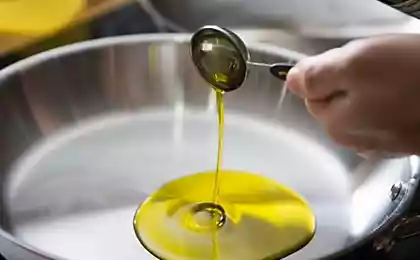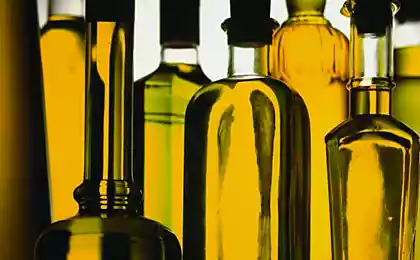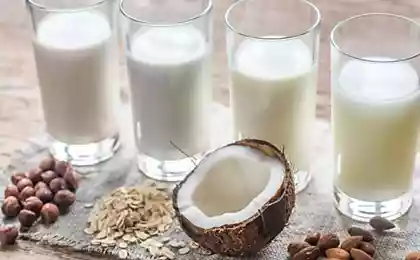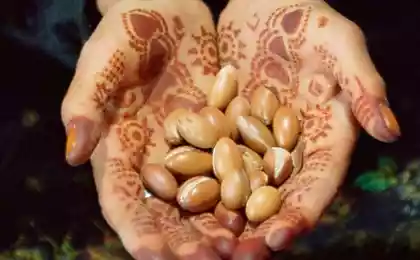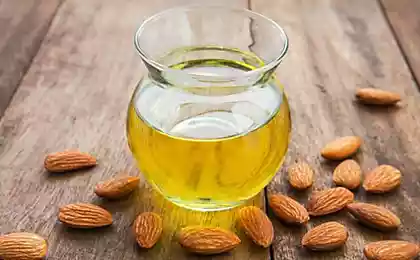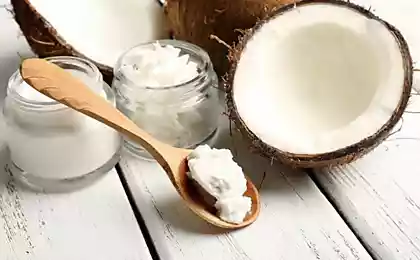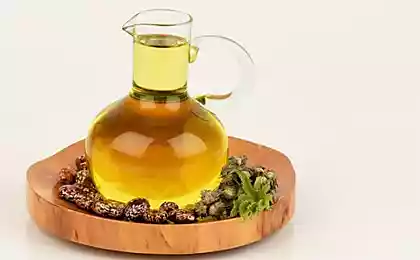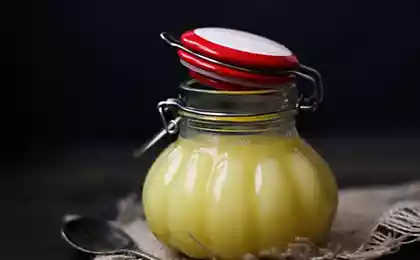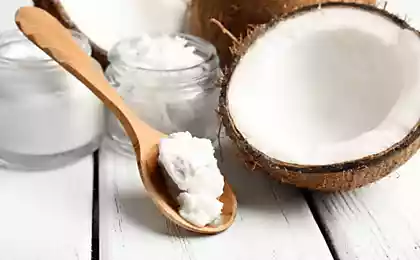681
Palm trees instead of cows, or as fake milk
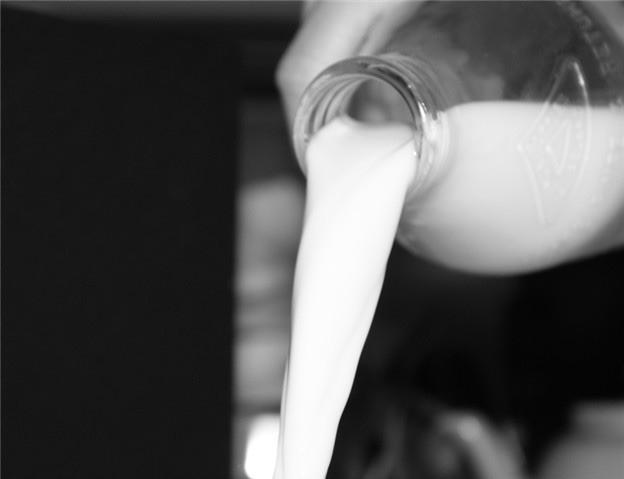
Up to 4 million tons produced in Russia dairy products can be made with vegetable fat, including palm oil. In some commodity groups the share of counterfeit drugs exceeds 50%. Substitutes reduce costs, but their widespread use discourages manufacturers of high-quality raw milk.
The use of vegetable fats in the production of dairy products is growing along with the import. Only in 2014 in Russia, according to the FCS, imported 706 thousand tons of palm oil at $642 million Is 5.5% less than in the record year 2013, but it is 6.2% more than in 2012. The largest supplier is Indonesia, its share in the past year had 82,9% of the total, or 585,5 thousand tons.
The production of dairy and milk products is increasing every year, in contrast to the production of raw materials. So naturally the question arises: what creates the product — natural milk or its substitutes.
As otdelyvayut accordance with the technical Regulations of dairy products in Russia are those that contain only milk fat. Milk production by 50% may consist of plant components. For example, in spreads, cheese and cheese products and milk and milk fat replacers (MFR). There are also cheese-like products — it has milk fat replaced by vegetable completely, but it will not fall under the technical Regulations. "These products mimic the cheese, repeating the production technology, but changing ingredients," explains the head of the Test laboratory "Milk" Elena Yurova. Call them dairy milk or not, but unscrupulous sellers repackage this item and mark it as cheese."
Manufacturers also allow for some violations in marking, but it concerns mainly dairy products (cheese, sour cream, etc.), production technology which is more simple.
In the dairy industry prohibited the use of tropical oils — can be included in the composition of the MFR, which is obtained after their processing. But it is more expensive, so manufacturers trying to save money, add into product directly oil, often still cheap technical, intended for the production of industrial goods, which has not been tested for suitability for food production. "The use of tropical oils instead of MFR is also considered a falsification, even if the label stated," knows the independent expert of the dairy market Tatyana Rybalova.
Dilute milk with vegetable fat may themselves farmers, continues Yurova. "A La farm products that are sold in bulk without labels, as well as any accompanying documents, fascinates customers with its "naturalness", but to control such a product is quite difficult, " she comments. And if you have any problems and poisoning cannot be treated, even in the CPS".
Therefore, in this case the trading network more secure for users: the risk is reduced due to the control of incoming product sales. If anything, the responsibility for violations will fall on the supplier and the manufacturer, which has full information, said Yurov.
Another kind of adulteration — the addition of beef fat instead of milk. "Some enterprising processors believe that they are similar in composition, so replacement is not a violation," says Yurov. To identify such a product is difficult because existing methods of analysis of the fat phase of dairy products suggest that is detection of vegetable fat by the presence of phytosterols. "But if the production uses animal fat, we find the same cholesterol in milk fat," she explains.
The introduction of new norms and rules for the control of dairy products to determine the falsification of any fat, regardless of their origin, is under discussion.
The deficit of milk raw materials or inability of processing industries (often small) for receipt and processing of raw materials also cause the spread of counterfeit continues Yurova.
Factories specializing in the production of powdered infant formula with the addition of vegetable fats, in combining different components, put on the counter "cream", "cheese" and other products that are not dairy. But such players, the market is gradually replacing itself.
Palm trees instead of karow recent years, the problem of falsification of dairy products worsened. The percentage of counterfeits varies depending on the region. According to Rospotrebnadzor, counterfeits make up between 5% and 10% of the total production of dairy products. However, in some areas the inspections show that the proportion of such products can reach up to 20% and on some items, such as butter, is even higher.
Butter and cheese — maloletka expensive products, in the case of appreciation they first begin to lose consumer demand, says the Chairman of the National Union of milk producers (Soyuzmoloko) Andrey Danilenko. "Therefore, unscrupulous producers are trying to reduce the cost and the final price, mixing natural raw milk with vegetable," he says. — More forgery to be found among the products of high fat content, ranging from ice cream and condensed milk, ending with the cheese.
Danilenko relates the increase in the proportion of adulterated dairy products with the increase of palm oil imports after the introduction of the food embargo.
Over the last five months of 2014 has been imported about 40 thousand tons more (a total of 366 kt) than in August-December 2013. Most likely, the growth of supply associated with the shortage of raw milk and processors to replace animal fats to vegetable fats, he suggests.
Although MFR can be produced not just from palm, but also from sunflower, rapeseed, soybean and other oils, demand is growing on him. Palm oil is cheaper than others, moreover, the consistency is solid and somewhat reminiscent of the spread, they can be widely applied not only in breast but also in oil, and confectionary industries as an alternative to margarine, says the CEO of a dairy plant "Penza" (included in "Damate") Roman Kalentiev.
First and foremost the dignity of vegetable fats feel processors which help reduce the cost of dairy products, agrees the analyst of investment holding "Finam" Timur Nigmatullin.
In addition, the use of substitutes allows to extend the shelf life, he knows. "For example, bakers have practically ceased to use butter, because he's all sweetness deteriorate much faster," says Nigmatullin.
But not so simple. Yurov believes that many manufacturers err on the low cost vegetable oils and some of their qualities. Recently due to the devaluation of the ruble, the difference in price between vegetable and milk fat decreased.
In addition, you need to evaluate not just the cost of the fat. "The introduction of plant substitutes in the product requires additional costs, because producers need to bring the smell and appearance of the product to natural milk, — draws attention the expert. For example, you may want to add powdered milk or mixtures, moisture-retaining agents, colorants, flavors, stabilizers, preservatives.
The output is not a cheap product. It is therefore safe to say that often to produce natural dairy products more profitable, concludes Yurova.
If the benefits of using vegetable fat in the current economic situation, you can challenge it, the cons are their negative effects on the human body. "Soyuzmoloko" are of the opinion that over-consumption of vegetable fats or use palm oil that has not passed the necessary cleanup before use, and intended for technical purposes, can cause problems with health.
Although there are groups of people who believe that vegetable fats are healthier milk, knows Andrei Danilenko. "This point of view has right to exist, but in any case, it is necessary to comply with legal requirements on the composition of cheese or cheese and do not introduce misleading consumers, giving vegetable fat for milk," he insists.
Rybalova recalls that the question about the benefits or harm of tropical vegetable oils still remains: different lobbyists expressed the opposite opinion. "However, all agree that their presence in infant formula is harmful, and many doctors advise adults to limit the consumption of these products in some diseases of the gastrointestinal tract, — the expert specifies. But in the case of massive falsification to control the consumption process difficult."
Harm not all vegetable fats are proven, says Nigmatullin. With a large consumption, there are risks of violation of mineral absorption and cardiovascular diseases. But if you are allergic to milk, even children in the special nutrition added vegetable fats, although they have to compensate for, as becoming more and more absorbed calcium, he says.
In European countries, the period of fascination with spreads and Margarines with dairy fat substitutes passed, knows Rybalova. For example, in Norway, where the development of the movement for a healthy lifestyle and proper diet, now considered the only correct choice butter with a fat content of 82.5%.
The demand for milk is not werereally the amount of adulteration it is difficult to assess, so it is difficult to talk about the extent of the use of vegetable oils and MFR. According to Rybalova, the production of such products may reach 4 million tons in terms of milk.
Nigmatullin believes that the market share of dairy products produced with the use of vegetable fats, not so great — about 600 thousand tons of Natural milk production around the widow more than one that somehow contains vegetable fats, compares Yurova. But this is the official data excluding fake, she emphasizes.
In principle, in itself the use of vegetable fats not so bad, but only if the manufacturer reports about it on the label. "Alas, that usually doesn't happen", — says Andrey Danilenko. However, the big players in this regard, usually inspire more confidence.
Danone Russia produces its products exclusively from natural milk, according to the company. "In our portfolio there is only one product with vegetable fats — milk cheese, which is produced under contract by a third party.
Its share in total sales Danone minor — less than 0.4%. All information about its composition, as well as other products of the company, included in the package and available to consumers," — said the press service of Danone on the request to "Agroinvestor". Representatives of the company stressed that no dairy plant of the group in Russia does not buy any vegetable fat.
Dairy plant Penzenskiy, too, uses MFR. Kalentiev understands the challenges of the industry and says that processors are replaced by milk fat with palm oil, including from-for shortages of raw milk. "According to our estimates, the deficit of marketable milk in the past year amounted to at least 15 million tons, and now he, most likely, will increase" — he suggests.
Given that the average price of raw milk in 2014 increased by 24% compared to 2013, after it increased the cost of dairy products. The processors are not able to substantially increase selling prices.
In this situation, some companies are starting to "combine" for example, buy skim milk (SOM) and restore it, just add non-dairy fat, a vegetable, especially palm oil. Then this "milk" they make any dairy product, knows Kalentiev.
Despite the shortage of milk as raw material, which they say the processors, the producers do not mention increase in demand for their products. Agricultural holding "Podgornov and K" (Vologda region) cooperates with Danone, "Ostankino dairy plant", the plant "Galaxy".
Director Polict the Podgornov said that his farms as businesses of many colleagues, is the question of preservation of business. Processors believe that the use of vegetable fats can get a higher margin, so the purchase of milk-raw materials are not growing, despite his lack of, the head.
"We expect the increase in demand, but it did not happen in late 2014 or early 2015, says the Podgornov. — Probably, it is connected with growth of consumer prices that many people can not afford to buy dairy products". Now the company delivers daily to the processing of 35-37 tonnes of milk, with the growth of demand volume could be 5-8 tons more.
While in the fourth quarter of 2014, a litre of milk the company received net profit of RUB 7-8, in early February, this figure dropped to 4. of/l, adds Podgornov. "All because purchase prices in the autumn has not changed, and the cost is increased by 3-4 RUB/l due to the rising feed prices, spare parts for the imported machinery and energy," — says the head.
To take controlpak there is not enough milk, raw material, and fabrication is gaining momentum, speaking about prospects of development of production of dairy products is quite difficult. One of the unfortunate outcomes, according to Rybalova, has become almost complete destruction of the domestic industry of cheese making. "Plants processed cheese should be renamed cheese products plants, similar situation with "natural" cheeses — she knows. — Producers of this cheese can be counted on one hand, their products are, by definition, can not be cheap, and with a further development of the crisis in the country and lower demand they will bear the losses." Now their yield is significantly lower than the companies producing the counterfeit.
According to Rosstat, the share of cheese products in the total production of cheese by the end of 2014 was 23.5%. Rybalova considers that in accordance with the applicable Technical regulations in the category of "cheese products" can get up to 70% of the production of domestic cheese. "Certainly, in Russia there are honest manufacturers that do not use vegetable oil, but can only vouch for some of them, — she admits. — On the shelves you can find, for example, Maasdam without a single hole whose label is given Moscow address of the manufacturer, while in the capital it was never a cheese-making enterprises, except for the processed cheese plant".
While Rybalova did not believe that with the cessation of the use of vegetable oils for the dairy industry will come a Golden age. "The decision of problems of dairy cattle breeding cannot be reduced to the fight against vegetable fats and distribution of counterfeit," she said. Is only one aspect of a complex problem."
As soon as I increase the milk production, the fight against counterfeit will automatically become more effective, while it mainly occurs in the words, the expert said.
One bans will not solve the problem, jointly Kalentiev. For example, in tsarist Russia, the use of palm oil was banned, however the butter was forged on an industrial scale. "We need to establish an effective traceability system from raw material to shelf" — he said. Is the maximum program and a minimum required total test products using methods of instrumental control."
But first, you need to raise the fines to convicted of counterfeit manufacturers do not pay the 100-200 thousand RUB., as it is now, and, for example, 1-2% of the turnover, he suggests. "And it's time to post the list of the enterprises-infringers on the website of the Ministry of agriculture that the country should know its "heroes" in person," adds Kalentiev. Andrey Danilenko also believes that market regulation will increase penalty for falsification of products. Nigmatullin is sure that the dairy sector needed greater control of the Supervisory authorities, to the market was transparent.
Enterprises relying on fake, will exist as long as the market will not be filled with high-quality natural products at an affordable price, think Yurova.
To achieve this we need investment in the modernization of production, as it was in Belarus. It is also necessary to improve production processes, improving efficiency and moving away from semi-manual production. If you do the cheese in the baths, while controlling the bad quality, it is impossible to stay in the market with competitive products, sums up the expert.published
Author: Alain White
P. S. And remember, only by changing their consumption — together we change the world! ©
Source: www.agroinvestor.ru/markets/article/18446-moloko-pod-palmoy/full/#cut
Scientists from IBM have solved one of the main problems of quantum computing
Microsoft is beginning to wonder photos



